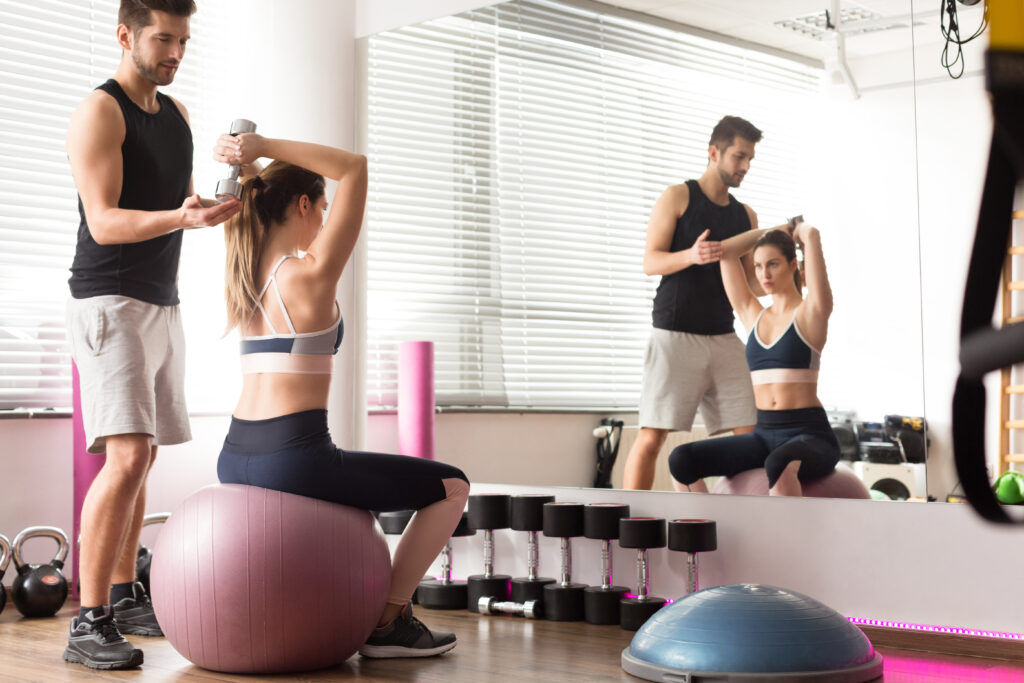Living with scoliosis can present unique challenges when it comes to exercise and maintaining a healthy lifestyle. Scoliosis, a condition characterized by an abnormal curvature of the spine, can vary in severity and often requires specialized attention. A common question rising from people is “Should I get a personal trainer if I have scoliosis?” Dr. Strauss explores the role of personal trainers in managing scoliosis, examining whether they are beneficial and exploring the potential advantages they can offer.
The Role of Personal Trainers for Scoliosis
Personal trainers play a crucial role in the fitness journey of many individuals, but are they equally beneficial for those with scoliosis? The answer lies in the individual’s needs, preferences, and the severity of their scoliosis.
Motivation for the Less Self-Motivated
One significant advantage of personal trainers is their ability to motivate individuals who struggle with self-motivation. For those with scoliosis, adhering to a regular exercise routine can be challenging, especially if they lack the intrinsic drive to stay committed. Having a personal trainer who provides guidance, support, and a structured exercise plan can be a game-changer.
“Personal trainers for scoliosis are fantastic for the person who is not self-motivated,” says Dr. Strauss. “So to have somebody come to your house and kind of make you do the exercises – hey, that really works for some people. There’s nothing wrong with that.”
Customized Exercise Plans
Individuals with scoliosis often benefit from tailored exercise plans that address their specific condition. While generic fitness routines may not consider the nuances of scoliotic curves, a personal trainer can design a program that targets core strength, flexibility, and overall stability, aiming to alleviate the impact of scoliosis on daily life.
Dr. Andrew Strauss adds, “What I do is I give the people the exercises in writing with pictures. I’m happy to speak to the personal trainer. We want to have all the members of the team together working to get the scoliosis under control, and if we can bring a personal trainer into the mix, hey, that’s a benefit.”
The Benefits of Personal Trainers for Scoliosis
Supervision and Correction
One of the primary advantages of having a personal trainer is the immediate feedback and correction they can provide. For individuals with scoliosis, maintaining proper form during exercises is crucial. A personal trainer can closely monitor movements, ensuring that exercises are executed correctly and that no undue stress is placed on the spine.
Improved Posture and Core Strength
Scoliosis often impacts posture and core strength. A well-designed exercise routine supervised by a personal trainer can target these specific areas, aiding in improving posture and strengthening the core muscles. Enhanced core strength contributes to better spinal support, potentially reducing the discomfort associated with scoliosis.
Tailored Approach to Individual Needs
Scoliosis varies greatly among individuals, and a one-size-fits-all approach to fitness may not be effective. Personal trainers can adapt exercises to suit the unique needs and limitations of each person with scoliosis. This personalized approach ensures that the fitness regimen aligns with the individual’s capabilities and minimizes the risk of exacerbating their condition.
Considerations Before Opting for a Personal Trainer
While personal trainers can offer significant benefits, there are certain considerations to keep in mind before deciding to work with one if you have scoliosis.
Severity of Scoliosis
The severity of scoliosis is a crucial factor. Individuals with mild to moderate scoliosis may find personal training highly beneficial, while those with severe curvature may require more specialized medical supervision. Consulting with a healthcare professional or an orthopedic specialist before embarking on a fitness journey is essential to ensure safety and efficacy.
Communication with Healthcare Professionals
Open communication between the personal trainer and the individual’s healthcare team is paramount. The trainer should be aware of the specific details of the scoliosis diagnosis, any prescribed exercises, and potential limitations. Collaboration among healthcare professionals and the personal trainer ensures a comprehensive and well-coordinated approach to managing scoliosis.
Should I get a Personal Trainer if I have Scoliosis?
The decision to enlist the help of a personal trainer when living with scoliosis is a personal one that should be made with careful consideration. Personal trainers can be instrumental in providing motivation, designing tailored exercise plans, and offering guidance for individuals with scoliosis. However, it is crucial to assess the severity of the condition, consult with healthcare professionals, and maintain open communication throughout the fitness journey.
Ultimately, if you have a personal trainer and wish to use their services to manage your scoliosis, it can be an excellent addition to your support team. As Dr. Strauss aptly puts it, “I don’t tell people to have a personal trainer, but if they’ve got one and they want to use them – excellent.” It’s about finding a balance that works for you, prioritizing your health, and taking steps towards a more active and fulfilling life, even in the presence of scoliosis.
Also read: How to Make your Mattress More Comfortable for Use?
About:
Dr. Strauss is the director of the Hudson Valley Scoliosis Correction Center in New York. He has been actively engaged in scoliosis treatment for the past 30 years and has authored two books on the subject, Your Child Has Scoliosis and The Truth About Adult Scoliosis.
He is Vice President of the CLEAR Scoliosis Institute and a lecturer for their introductory and advanced workshops. He is certified in scoliosis bracing and in the use of scoliosis specific exercises. Dr. Strauss is a graduate of the ISICO World Masters of Scoliosis.His postgraduate studies also include a Masters Degree in Acupuncture as well as training in Grostic, Pettibon, CBP, Clinical Nutrition, Chinese Herbal Medicine, Manipulation under Anesthesia, and Electrodiagnosis.
His scoliosis practice has treated patients from 25 states and 32 other foreign countries.If you have questions about childhood and adult scoliosis and how it can be successfully treated without surgery subscribe to our channel!
